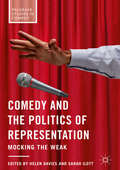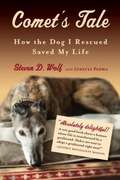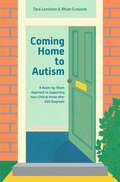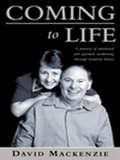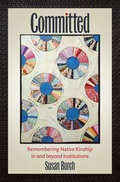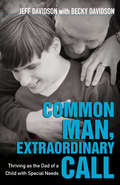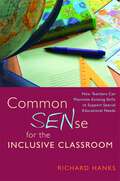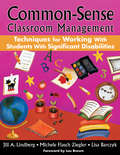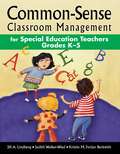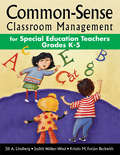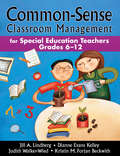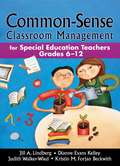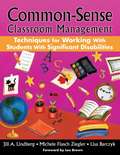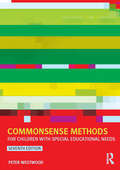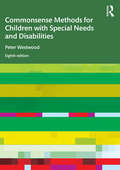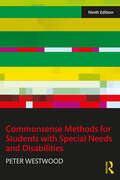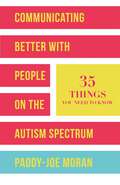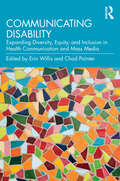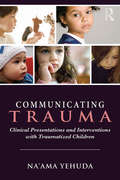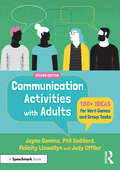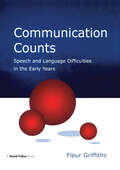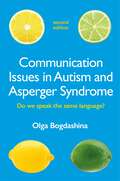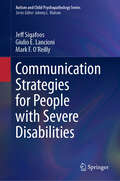- Table View
- List View
Comedy and the Politics of Representation: Mocking the Weak (Palgrave Studies in Comedy)
by Helen Davies Sarah IlottThis edited collection explores the representations of identity in comedy and interrogates the ways in which “humorous” constructions of gender, sexuality, ethnicity, religion, class and disability raise serious issues about privilege, agency and oppression in popular culture. Should there be limits to free speech when humour is aimed at marginalised social groups? What are the limits of free speech when comedy pokes fun at those who hold social power? Can taboo joking be used towards politically progressive ends? Can stereotypes be mocked through their re-invocation? Comedy and the Politics of Representation: Mocking the Weak breaks new theoretical ground by demonstrating how the way people are represented mediates the triadic relationship set up in comedy between teller, audience and butt of the joke. By bringing together a selection of essays from international scholars, this study unpacks and examines the dynamic role that humour plays in making and remaking identity and power relations in culture and society.
Comet's Tale: How The Dog I Rescued Saved My Life
by Steven D. WolfComet's Tale is a story about a friendship between two former winners, both a little down on their luck, who together stage a remarkable comeback. A former hard-driving attorney, Steven Wolf has reluctantly left his job and family and moved to Arizona for its warm winter climate. There he is drawn to a local group that rescues abused racing greyhounds. Although he can barely take care of himself because of a spinal condition, Wolf adopts Comet, an elegant cinnamon-striped racer. Or does Comet adopt Wolf? In Comet's Tale we follow their funny and moving journey as Wolf teaches Comet to be a service dog. With her boundless enthusiasm and regal manners, Comet attracts new friends to Wolf's isolated world. And finally, she plays a crucial role in restoring his health, saving his marriage, and broadening his definition of success.
Coming Home to Autism: A Room-by-Room Approach to Supporting Your Child at Home after ASD Diagnosis
by Tara Leniston Rhian GroundsWhat does an autism diagnosis mean for everyday family life? Explore different rooms in the home to better understand how children with autism experience daily activities, and what you can do to support their development. · Head to the bathroom for guidance on toilet training and introducing a calming bath time ritual. · Discover how to create a safe haven for your child in the bedroom chapter, with tips to try before bedtime to help ease anxiety. · Learn how to transform any corner of your home into a special place for sensory play, fun and learning · Settle down in the parents' corner for top advice on remaining cool, calm and collected in the face of obstacles. Co-written by a mum and a speech-language therapist, and with many more rooms to visit, this book breaks down the information that you need to know to support children with autism at home.
Coming to Life
by David MackenzieA man and his family come to terms with his fatal disease and it sharpens their appreciation of life.
Coming to my Senses
by Pam RiceAddie Marsh is a grandmother, living in the small mountain town of Pinecliff, CO. She is becoming blind from macular degeneration and her son wants her to move intot he city in an assisted living complex. Addie joins a vision loss support group and slowly learns acceptance and new skills, and makes friends along the way. Throughout the story, she relives her life as a wife and mother of war casualties, from the 1930s forward.
Committed: Remembering Native Kinship in and beyond Institutions (Critical Indigeneities)
by Susan BurchBetween 1902 and 1934, the United States confined hundreds of adults and children from dozens of Native nations at the Canton Asylum for Insane Indians, a federal psychiatric hospital in South Dakota. But detention at the Indian Asylum, as families experienced it, was not the beginning or end of the story. For them, Canton Asylum was one of many places of imposed removal and confinement, including reservations, boarding schools, orphanages, and prison-hospitals. Despite the long reach of institutionalization for those forcibly held at the Asylum, the tenacity of relationships extended within and beyond institutional walls. In this accessible and innovative work, Susan Burch tells the story of the Indigenous people—families, communities, and nations, across generations to the present day—who have experienced the impact of this history. Drawing on oral history interviews, correspondence, material objects, and archival sources, Burch reframes the histories of institutionalized people and the places that held them. Committed expands the boundaries of Native American history, disability studies, and U.S. social and cultural history generally.
Common Man, Extraordinary Call: Thriving as the Dad of a Child with Special Needs
by Jeff Davidson Becky DavidsonChallenges, equips, and inspires fathers of children with special needsBecoming the father of a child with special needs can feel like being drafted into the military--and starting duty as a general. Dad is expected to know how to set rules and run drills without any training in leadership. And there are very few resources for men who want to be involved but need guidance and specific ideas. Overwhelmed, many fathers end up going AWOL on their families.As a twenty-year veteran of special-needs parenting, Jeff Davidson wrote a field manual to give fathers the skills required for the day-to-day demands of parenting. Jeff helps men discover God's new mission for their lives in each of five specific roles: warrior, protector, provider, encourager, and equipper. He offers rich, real-life examples from dads in the field and a no-nonsense approach from initial diagnosis onward. This book is filled with practical how-tos for parenting in the special needs world, bullet points for easy reading and quick reference, and a Mission Critical synopsis at the end of each chapter.Informal and task-oriented, Common Man, Extraordinary Call offers growth and hope for men with little free time. And as they process their instructions, they'll be able to mentor other fathers, creating a strong army of men who not only survive but thrive as capable dads to their children with special needs.
Common SENse for the Inclusive Classroom
by Richard HanksThis book condenses everything the mainstream teacher needs to know about Special Educational Needs into one short volume, allowing them to pick and choose teaching methods that suit them and each individual student. Following a revolutionary 'a la carte' concept, the book acts first and foremost as a teaching menu, offering a variety of options that teachers can use as they see fit. Written in a jargon-free, accessible style, the author gets to the heart of issues associated with teaching mixed ability classes, offering more flexible alternatives to traditional teaching strategies and suggesting helpful approaches that really work. Maintaining that teachers are usually far more capable of handling situations than they believe themselves to be, the book allows them to choose methods that suit their own personal style and the specific needs of their students. Essential background information on special educational needs including dyslexia, dyspraxia, Asperger's Syndrome and Attention Deficit Hyperactivity Disorder is included throughout. Combining practical methodology with factual information about learning difficulties, this guide will be an invaluable resource for non-specialist teachers supporting children with special educational needs in inclusive classrooms.
Common-Sense Classroom Management Techniques for Working With Students With Significant Disabilities
by Jill A. Lindberg Michele F. Ziegler Lisa BarczykThis invaluable handbook provides teachers with common-sense strategies, tools, and templates to ensure the best possible educational outcomes for learners with significant disabilities.
Common-Sense Classroom Management for Special Education Teachers Grades K5: For Special Education Teachers, Grades 6-12 (Common-sense Classroom Management Ser.)
by Jill A. Lindberg Kristin M. Forjan Beckwith Judith Walker-WiedSpecial help for special education teachers means special success for students!Do you have too many IEPs on your desk? Is it five o'clock and do you still need to contact parents, social workers, and general education co-teachers? Teachers new to special education often feel overwhelmed at the amount of additional planning and information management required.This practical guide shows you how to shape the structure of the teaching day to ensure that learners with special needs experience success. It includes simple teacher-tested, easy-to-implement strategies needing 5 steps or fewer to: Organize students to make the most of the time you have with them Use incentive programs and meaningful consequences to achieve desired behaviors Coordinate with co-teachers, general education teachers, and staff to maximize your effortsSpecial Education teachers face different challenges, paperwork shouldn't be one of them. When the key paperwork is at your fingertips, the lesson plan is prepared, and the to-do list is written, you will find more time in your day for what's most important-your students!
Common-Sense Classroom Management for Special Education Teachers, Grades K-5
by Jill A. Lindberg Judith K. Walker-Wied Kristin M. BeckwithThis practical guide gives teachers simple strategies for organizing their classrooms and pacing their day to ensure that learners with special needs experience success.
Common-Sense Classroom Management for Special Education Teachers, Grades 6-12
by Jill A. Lindberg Dianne Evans Kelley Judith K. Walker-Wied Kristin M. BeckwithThese 80 easy to adapt strategies work in five steps or fewer to help special educators feel confident about working with co-teachers, teacher aides, support staff, administrators, and families.
Common-Sense Classroom Management: For Special Education Teachers, Grades 6-12 (1-off Ser.)
by Jill A. Lindberg Kristin M. Forjan Beckwith Judith Walker-Wied Dianne Evans KelleyIf you're a teacher new to special education, this book is for you! This newest Common-Sense Classroom Management guide addresses the most critical challenges that arise when teaching adolescent learners with special needs. In this flexible and easy-to-implement resource, educators will find 80 concise and teacher-tested strategies. Each strategy works in five steps or fewer, helping special educators feel competent and confident about working with co-teachers, teacher aides, support staff, administrators, and families. The authors, all special education experts, provide practical assistance with: * Specially designed instruction and student organization to make teaching more effective * Legal responsibilities aligned with IDEIA and NCLB requirements * Positive behavioral supports, including incentive programs and meaningful consequences Ideal for teachers new to special education, teacher trainers, and teacher mentors, this resource provides a clear-sighted focus to help you shape the structure of each teaching day and ensure success for all your learners with special needs!
Common-Sense Classroom Management: Techniques for Working with Students with Significant Disabilities
by Jill A. Lindberg Lisa Barczyk Michele Flasch ZieglerToday's diverse classrooms challenge even the most experienced teachers. Using an easy-to-read format, this resource offers tools and techniques that teachers can use to reach all learners, particularly those with more significant disabilities, and give them the support they need to succeed.
Commonsense Methods for Children with Special Educational Needs
by Peter WestwoodThis fully revised and updated seventh edition of Commonsense Methods for Children with Special Educational Needs continues to offer practical advice on evidence-based teaching methods and intervention strategies for helping children with a wide range of disabilities or difficulties. The advice the author provides is embedded within a clear theoretical context and draws on the latest international research and literature from the field. Coverage includes: learning difficulties and disabilities students with autism spectrum disorders, intellectual disability, physical or health issues, and sensory impairments gifted and talented students developing social skills and self-management behaviour management teaching methods literacy and numeracy curriculum differentiation and adaptive teaching computer-based instruction and e-learning. Peter Westwood also provides additional information and advice on transition from school to employment for students with disabilities, lesson study, e-learning, and computer-aided instruction, and reflects on the important changes made within the latest Diagnostic and Statistical Manual of Mental Disorders (DSM-5).
Commonsense Methods for Children with Special Needs and Disabilities
by Peter WestwoodThis fully revised and updated eighth edition of Peter Westwood’s book offers practical advice and strategies for meeting the challenge of inclusive teaching. Based on the latest international research from the field, it offers practical advice on both new and well-tried evidence-based approaches and strategies for teaching students with a wide range of difficulties. As well as covering special educational needs, learning difficulties, and disabilities in detail, chapters also explore topics such as self-management and autonomy, managing behaviour, and social skills. The book offers sound pedagogical practices and strategies for adapting curriculum content, designing teaching materials, differentiating instruction for mixed-ability classes, and implementing inclusive assessment of learning. Key features of this new edition include: Additional information on linking all aspects of teaching to a Response-to-Intervention Model A focus on the increasing importance of digital technology in supporting the learning of students with special educational needs and disabilities Up-to-date resource lists for each chapter, for those who wish to pursue a particular topic in greater depth Reflecting cutting-edge international research and teaching practices, this is an invaluable resource for practising and trainee teachers, teaching assistants, and other educational professionals looking to support students with special educational needs and disabilities.
Commonsense Methods for Students with Special Needs and Disabilities
by Peter WestwoodThis fully revised ninth edition continues to offer teachers practical advice on new evidence-based approaches for teaching and managing students with a wide range of abilities, disabilities, and difficulties.Based on topical international research from the field, this new edition provides practical advice for teachers and tutors to enable them to adapt evidence-based methods when working in inclusive settings with students with special needs, including gifted and talented students. Throughout the text, approaches to teaching and classroom management have been clearly described. New methods, programmes, and interventions are reviewed, and there is increased coverage of digital technology and e-learning. Teachers will also find support and guidance for working with students with learning difficulties in literacy and numeracy, teaching students with physical, sensory and intellectual disability, fostering students’ autonomy, social skills interventions, approaches to autism spectrum disorders, and much more. All new information in every chapter is fully supported with reference to the most recent writing and research.This continues to be an invaluable resource for practising and trainee teachers, tutors, teaching assistants, and other education professionals responsible for supporting students in inclusive schools.
Communicating Better with People on the Autism Spectrum: 35 Things You Need to Know
by Paddy-Joe MoranCovering verbal and non-verbal communication, Paddy-Joe Moran presents 35 simple tips and strategies to help professionals improve their communication and relationships with individuals on the autism spectrum. The language that professionals choose to use can have a long-term impact on autistic people. This book provides easy-to-implement suggestions to guarantee effective and sensitive communication. It explains everything from person-first language through to the use of specific, rather than open-ended, questions, and a focus on taking the individual's lead with their preferred language and terminology is central to the book.
Communicating Disability: Expanding Diversity, Equity, and Inclusion in Health Communication and Mass Media
by Chad Painter Erin WillisThis book enables readers to confidently discuss and understand disability as part of the broader societal conversation on diversity, equity, and inclusion.The influence of mass media can raise awareness, educate, reduce stigma, facilitate advocacy related to disability, and activate attitude and behavior change. Recognizing that disability is a complex, multi-dimensional topic, this book presents case studies, original research, and practical applications related to society and cultural events about disability to highlight prominent issues related to diversity, equity, and inclusion initiatives. While previous work examined disability through activism or historical lenses, this book explores contemporary industry practices and how current conversations are driving trends in the field. Divided into three parts related to journalism and news reporting, strategic communication, and health communication, the book provides readers with the knowledge and skills to create conversation that gives space to disability and facilitates advancement in inclusion.Filling a void in disability literature, this book will be of interest to scholars as well as undergraduate and graduate students in the fields of health communication, journalism, strategic communication, media studies, disability studies, public health, and medical sociology.
Communicating Effectively with People with a Learning Disability
by Sue ThurmanIf you are working within the learning disability sector and studying for the QCF Diploma in Health and Social Care, you will find this book invaluable in helping you to achieve the unit on Communicating effectively. It explain how communication affects all aspects of your work, including relationships, and provides guidance on how to overcome barriers to good communication. The book is easy to navigate, with each chapter covering one of the learning outcomes within the unit. Each chapter begins with an example taken from real people's stories and lots of activities, photographs and other illustrations are included throughout.
Communicating Trauma: Clinical Presentations and Interventions with Traumatized Children
by Na'Ama YehudaCommunicating Trauma explores the various aspects of language and communication and how their development can be affected by childhood trauma and overwhelm. Multiple case-study vignettes describe how different kinds of childhood trauma can manifest in children's ability to relate, attend, learn, and communicate. <P><P> These examples offer ways to understand, respond, and support children who are communicating overwhelm. In this book, psychotherapists, speech-language pathologists, social workers, educators, occupational and physical therapists, medical personnel, foster parents, adoption agencies, and other child professionals and caregivers will find information and practical direction for improving connection and behavior, reducing miscommunication, and giving a voice to those who are often our most challenging children.
Communication Activities with Adults: 100+ Ideas for Word Games and Group Tasks
by Jayne Comins Felicity Llewellyn Judy Offiler Phil GoddardProviding over 100 ideas for word games and group activities, this book is the perfect timesaver for the busy practitioner. The instructions for each activity have been kept to a minimum, so you can easily adapt it to your clients’ communication, cognitive, and reading skills. This is a new edition of a book that has been in print for over forty years. It includes brand-new activities and a full update of existing ones to make them relevant to the 2020s. Tasks are divided into three sections: Short Answers, suitable for limited communication or quick-fire tests; more demanding Longer Answers that require a series of words or sentences; and Longest Answers, for more open-ended tasks and group work. The handbook will allow anyone working with groups and individuals with communication difficulties to plan sessions quickly and easily. It has long been an essential part of the toolkit for every speech and language therapist, care professional, and activity provider. Most importantly, it is intended to get people talking, and to make therapy fun for you and your clients.
Communication Counts: Speech and Language Difficulties in the Early Years
by Fleur GriffithsProfessionals in early years settings can use this book to focus on ways in which they can work collaboratively with colleagues, in order to help children with communication difficulties to understand and express themselves more fully. It brings together the most useful examples of good practice and draws on the work of reflective practitioners. There are many illustrative case studies provided and it discusses how to observe children's daily interactions, ways in which such observations can be used to improve communication skills; how play can be an important part of improvement; behavior management and support; and literacy development. The practical applications are highlighted throughout the book and the advice given comes directly from those working in early years settings. It should be of great interest to all nursery teachers, teaching assistants, speech and language therapists and parents wishing to play an active part in their children's development of language and communication skills.
Communication Issues in Autism and Asperger Syndrome, Second Edition: Do we speak the same language?
by Olga BogdashinaIn this updated edition, Olga Bogdashina provides a theoretical foundation for understanding communication and language impairments specific to autism. She explores the effects of different perceptual and cognitive styles on the communication and language development of autistic children. She also stresses the importance of identifying each individual's nonverbal language - which can be visual, tactile, kinaesthetic, auditory, olfactory or gustatory - to establish verbal communication. Reflecting recent research and changes in terminology, the book explains why some approaches may work for some autistic children but not for others, and the 'What They Say' sections allow the reader to see through the eyes of autistic individuals and understand their language differences first-hand. 'What We Can Do to Help' sections throughout the book give practical recommendations for helping autistic individuals use their natural mechanisms to learn and develop social and communicative skills. The final chapters are devoted to assessment and intervention issues with recommendations for selecting appropriate methods and techniques to enhance communication, based on the specific mode of communication a person uses.
Communication Strategies for People with Severe Disabilities (Autism and Child Psychopathology Series)
by Jeff Sigafoos Giulio E. Lancioni Mark F. O’ReillyThis book describes communication strategies for people with severe disabilities who are nonverbal or minimally verbal. It examines the major assessment and intervention strategies that have been developed to enable expressive and receptive communication. In addition, the book explores contemporary research focused on teaching nonverbal and minimally verbal persons to use a range of communication strategies for expressive and receptive communication. It addresses the advantages and disadvantages of each communication strategy, selecting curriculum for communication intervention programs, and assessing the communication needs of individuals with severe disabilities who are nonverbal or minimally verbal. Key areas of coverage include: Assessing communication strengths and areas of intervention need. Developing communication intervention curricula. Prelinguistic intervention. Natural gestures and manual signing strategies. Aided augmentative and alternative communication strategies, including tangible symbols, picture-based systems, speech-generating devices, and assistive technology solutions for individuals with sensory-motor impairment. Visual strategies to enhance receptive communication. Communication Strategies for People with Severe Disabilities is an invaluable resource for clinicians, therapists, and other professionals as well as researchers, professors, and graduate students in the interrelated fields of clinical child and school psychology, developmental psychology, child and adolescent psychiatry, clinical social work, applied behavior analysis, augmentative and alternative communication, special education, and speech-language pathology.
